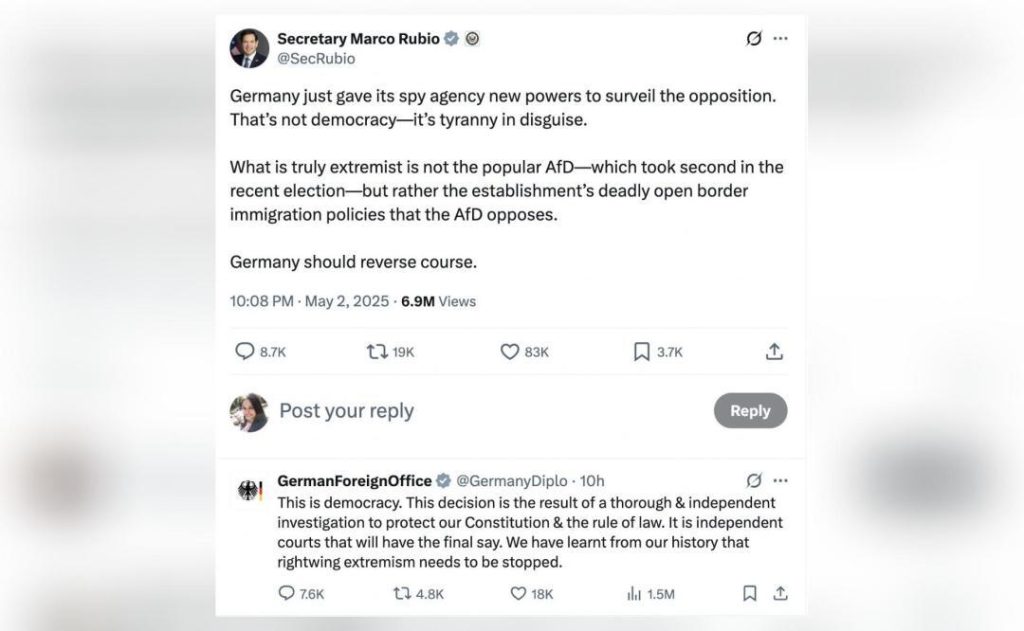
US’ Rubio & German Govt Clash Over AfD Party’s ‘Extremist’ Tag
A heated controversy has erupted between the United States and Germany over the latter’s decision to term the far-right Alternative for Germany (AfD) party as “extremist”. US Secretary of State Marco Rubio has accused Germany of enabling “tyranny in disguise” by designating the AfD party as extremist, sparking a clash with the German Foreign Ministry.
The controversy began when Germany’s domestic intelligence agency, the Federal Office for the Protection of the Constitution (BfV), announced that it had classified the AfD as an “extremist” party due to its anti-constitutional goals and actions. The BfV cited the party’s anti-immigrant and anti-Muslim rhetoric, as well as its alleged ties to extremist groups, as justification for the designation.
However, Rubio, who has been a vocal critic of the AfD party, took to social media to express his strong disapproval of Germany’s decision. In a tweet, he accused the German government of enabling “tyranny in disguise” by labeling the AfD as extremist. “Germany’s decision to label the AfD as ‘extremist’ is an attempt to silence political opponents and undermine the democratic process,” Rubio wrote.
The German Foreign Ministry responded to Rubio’s remarks by defending the BfV’s decision as a necessary step to protect the country’s Constitution. “The decision regarding AfD is a result of thorough investigations to protect our Constitution,” the ministry said in a statement.
The controversy has raised concerns about the balance between freedom of speech and the need to combat extremism. While some argue that the AfD’s rhetoric and actions are indeed extremist and pose a threat to democracy, others fear that labeling the party as such may be seen as an attempt to suppress political dissent.
The AfD party has been a major force in German politics since its founding in 2013. While it has never held the majority in the German parliament, it has consistently polled high and has become a major player in the country’s political landscape.
The party’s rhetoric has been criticized for being anti-immigrant, anti-Muslim, and anti-EU. Its leaders have also been accused of making anti-Semitic comments and promoting conspiracy theories.
Despite the controversy, the AfD party has denied any ties to extremist groups and has dismissed the BfV’s classification as an “attack on democracy”. The party’s leaders have also accused Germany’s government of being “afraid” of the AfD and its popularity.
The clash between Rubio and the German Foreign Ministry is not the first time that the two have disagreed on issues related to extremism and terrorism. In the past, Rubio has been critical of Germany’s handling of the refugee crisis and has accused the country of being “soft” on terrorism.
The controversy has also sparked concerns about the impact of social media on political discourse. Rubio’s tweet calling the German government’s decision “tyranny in disguise” was widely shared and sparked a heated debate on social media. However, some critics have accused Rubio of using social media to spread misinformation and stoke divisions.
In conclusion, the clash between Rubio and the German Foreign Ministry over the AfD party’s “extremist” designation highlights the complex and often contentious nature of political discourse in the digital age. While the BfV’s decision to label the AfD as extremist may be seen as a necessary step to protect the German Constitution, it also raises concerns about the balance between freedom of speech and the need to combat extremism.
Ultimately, the controversy serves as a reminder of the importance of critical thinking and nuanced analysis in political discourse. As we navigate the complexities of the digital age, it is essential that we remain vigilant and committed to upholding the principles of democracy and freedom of speech.



